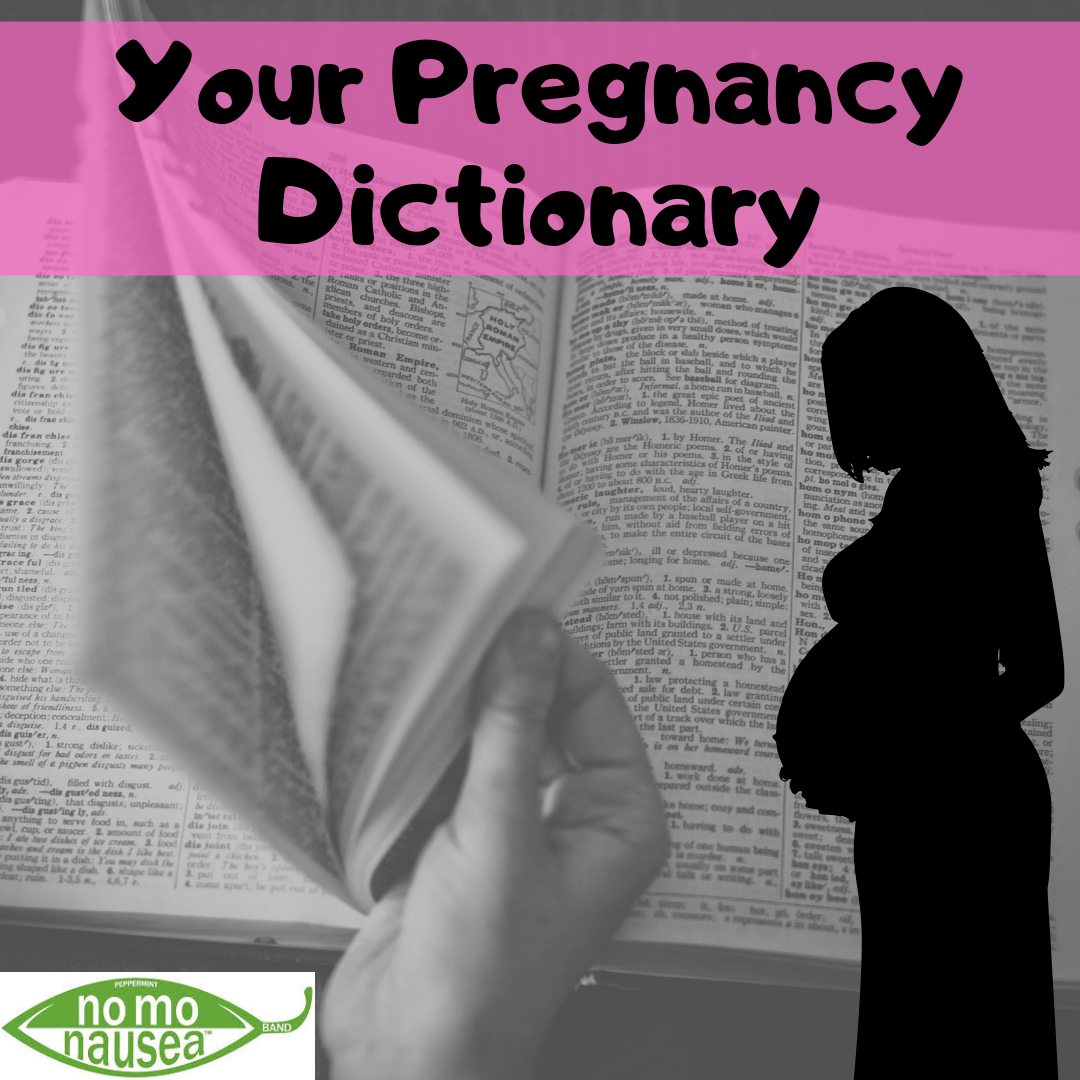
Confused what Your OB is Saying? Check this out...
Have You Ever Said, "I'm Sorry, Can You Repeat That, Doctor?"

Navigating pregnancy can be overwhelming enough without having to learn an entirely new language. But fear not, because we've got your back! Introducing NoMo Nausea's Pregnant Woman's Dictionary. This comprehensive guide will help you decode the complex terminology you may encounter during office visits, conversations with fellow moms, and interactions with healthcare professionals. We'll make sure you're well-equipped to confidently navigate the world of pregnancy and motherhood. Plus, don't forget to check out our NoMo Nausea Band - a wearable solution that provides instant relief from morning sickness. Say goodbye to nausea and embrace the joy of pregnancy!
Meet the Experts
Gynecologist: A physician who specializes in women's health.
Neonatologist: A physician who specializes in the care of newborns.
 Obstetrician: A physician who specializes in pregnancy, childbirth, and postpartum care.
Obstetrician: A physician who specializes in pregnancy, childbirth, and postpartum care.
Understanding the Common Terms
Antepartum: Refers to the period before childbirth.
Postpartum: Refers to the period after childbirth.
Nulligravida: Describes a woman who has never been pregnant before.
Primigravida: Refers to a woman who has had one previous pregnancy.
Multigravida: Describes a woman who has had multiple previous pregnancies.
Nullipara: Refers to a woman who has never given birth before.
Primipara: Describes a woman who has had one previous childbirth experience.
 Multipara: Describes a woman who has had multiple previous childbirth experiences. (Planning for baby number two? Check out our blog: The Scoop on the Unexpected when You're Expecting Again!)
Multipara: Describes a woman who has had multiple previous childbirth experiences. (Planning for baby number two? Check out our blog: The Scoop on the Unexpected when You're Expecting Again!)
Unraveling the Hormones
hCG: Human Chorionic Gonadotropin. This hormone is detected in urine during pregnancy tests. It typically spikes between the 8th and 11th week of pregnancy.
Oxytocin: Known as the "love hormone," oxytocin is secreted during physical bonding moments such as sex, labor, delivery, and breastfeeding. Its main function is to help signal contractions and progress labor.
Progesterone: Produced by the corpus luteum and later by the placenta during pregnancy, progesterone inhibits contractions throughout most of the pregnancy.
Prolactin: Secreted by the anterior pituitary gland, prolactin plays a vital role in helping women produce milk for breastfeeding.
Relaxin: This hormone helps inhibit contractions in early pregnancy and softens and lengthens the cervix and pubic symphysis in late pregnancy.
Unveiling Natural Processes & Common Terms
Braxton Hicks Contractions: Often referred to as "false alarms," Braxton Hicks contractions are small contractions that can occur late in pregnancy. While they may feel like real contractions, they are generally harmless and serve as preparations for the actual labor process.
Conception: The process of fertilization and implantation. It involves the sperm fertilizing the egg, resulting in the formation of a zygote, which eventually implants itself in the uterus.
Understanding and communicating these terms with your healthcare providers and fellow moms is important for a smoother pregnancy journey. To further support your pregnancy, consider trying the NoMo Nausea Band, a wearable solution that provides instant relief from morning sickness. It's a natural and effective way to manage one of the most common pregnancy symptoms. As you embark on this incredible journey of pregnancy and motherhood, remember that knowledge is power. Arm yourself with information, communicate openly with your healthcare providers, and trust your instincts. You've got this!
Buy the Best Motion Sickness Bracelet
NoMo Nausea is a 3 and 1 essential oil infused pressure bracelet that is clinically proven to stop nausea or vomiting in seconds. Imagine a life with a comfortable pregnancy, and enjoyable day at sea, a family fun car trip, or just a hangover free weekend? That's what NoMo Nausea bracelet can do for you. So say no more to your nausea or upset stomach.
You can find NoMo Nausea on https://nomonausea.com and get 25% off with the coupon PUKE25.

Dr. in Naturopathy answers
Can NOMO NAUSEA wristbands for pregnancy provide nausea relief for pregnant women? These nausea bands can!
Do you have nausea in pregnancy? Or know someone who has terrible pregnancy sickness, also known as morning sickness? Discover who these nausea wristbands for pregnancy work best for. Seeking nausea relief & pregnant... Women, these acupressure bracelets known as the waterproof and peppermint scented sea bands called NOMO NAUSEA can truly alleviate morning sickness during pregnancy in 30 seconds or less. Invented by a pregnant doctor who suffered with terrible nausea during and after giving birth, hence why this Dr. in Naturopathy continues exploring the causes of pregnancy nausea and the science behind these natural remedies on NoMo Nausea's blog, and then explore similar topics on our website at https://nomonausea.com/blogs/healthandwellness. Buy the Best Anti-Nausea Bands called No More Nausea Bands, motin sickness bracelets for pregnancy, now for only $12 on Amazon at www.amazon.com/nomonausea.

Buy the Best Morning Sickness Bracelet


